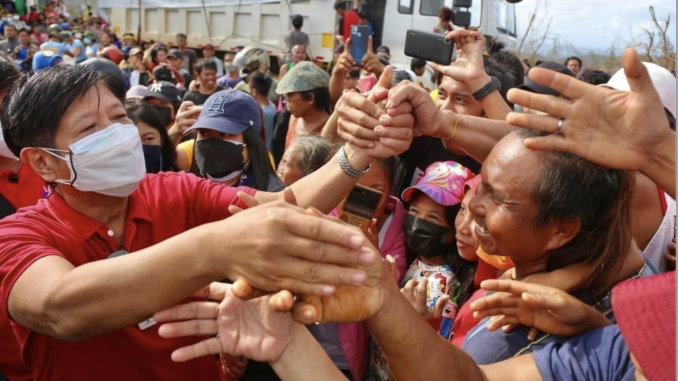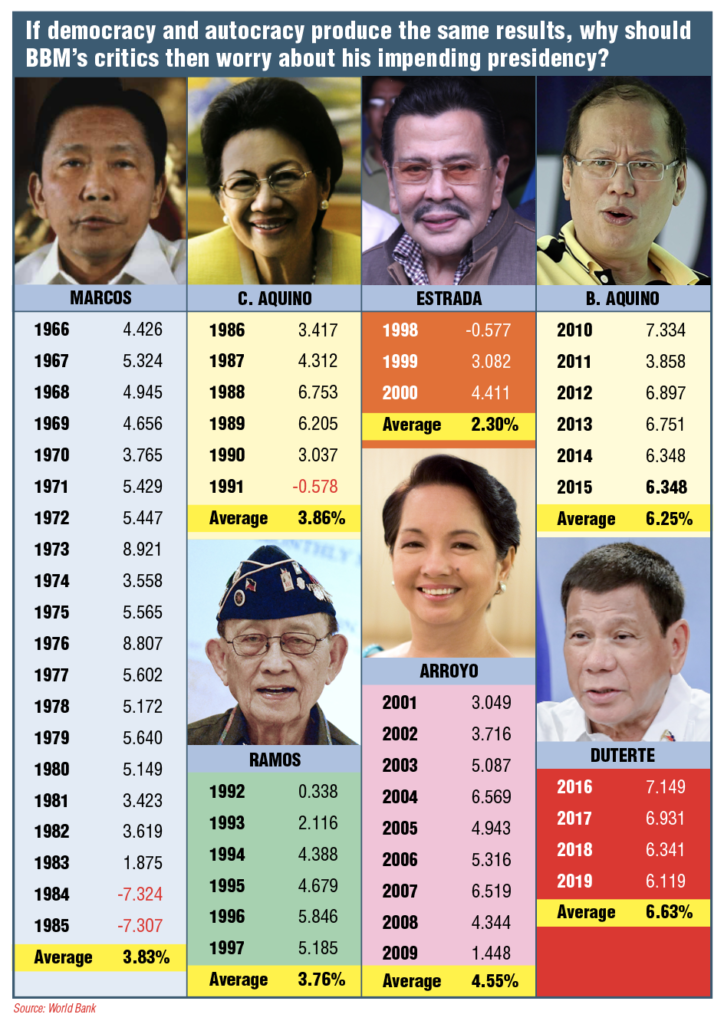
Bongbong’s victory, if allowed by fate, the Comelec and its machines, and of course, by people power, will be a stunning turn of events for a country that has been imprisoned for the last half century in the Prism (in Jedi terms) of a family rivalry between the Marcoses and the Aquinos.
By Antonio S. Lopez
If you believe surveys (I do), the next president of the Philippines is former Senator Ferdinand “Bongbong” Marcos Jr., 64.
All the major and most recent surveys show an overwhelming and landslide victory by the son of the longest-serving and most vilified Philippine president, Ferdinand Edralin Marcos, chief executive from Dec. 30,1965 to Feb. 25, 1986, a total of 20 years, 14 of them under martial law or one-man rule that gave the elder Marcos his strongman gravitas.
Bongbong Marcos got 47% of the vote in the SWS survey of October 2021, 58% in the Laylo poll of Nov. 22-29, 2021, 53% in the Pulse Asia survey of Dec. 1-6, 54% in OCTA Research of Dec. 7-12, 2021, and 62% in the private poll of 3,600 respondents (one the largest) done by a Swiss consultant for the Marcos campaign.
Leni Robredo did 18% in SWS, 13% in Laylo, 20% in Pulse Asia, 14% in OCTA, and 15% in Swiss. She is going up and down in surveys, indicating a lack of solid base, if not a declining base of support.
Probably, near the May 9, 2022 or by April 2022, VP Leni will end up a poor third to Manila Mayor Isko Moreno. The other candidates, Manny Pacquiao and Ping Lacson, are stagnating in single digits.
Bongbong’s victory, if allowed by fate, the Comelec and its machines, and of course, by people power, will be a stunning turn of events for a country that has been imprisoned for the last half century in the Prism (in Jedi terms) of a family rivalry between the Marcoses and the Cojuangco-Aquino clan of slain Senator Benigno S. Aquino Jr..
Ninoy’s assassination, blamed on Marcos (rather unfairly), triggered two presidencies for the Aquino family—six years and four months under his widow Corazon Cojuangco Aquino (Feb. 25, 1986-June 30,1992) and six years under their only son, Benigno Simeon (BS) Cojuangco Aquino III, June 30, 2010-June 30, 2016.
Cory’s stint was marked by nine coup attempts, the worst volcanic eruption of the century, the worst earthquake of the century, the worst sea accident, and massive floods. The communist New People’s Army rose to its mightiest, with 35,000 regular guerillas. The separatist movement, somehow muddled into a stalemate by Marcos, was revived with Nur Misuari having a summit with Cory in the MNLF territory in Jolo, Sulu, Mindanao, in1986, with the president of the Philippines surrounded by fully armed Muslim separatists. I covered the event and we newsmen went thru at least three checkpoints manned by the guerillas. The presidential party passed thru the same checkpoints.


Noynoy Aquino’s presidency was marked, among others things, by the Mamasapano massacre and the Yolanda disaster. In both, he was out of his wits and mostly detached.
There is very little difference between a democratic rule and a dictatorship or ruthless rule.
Marcos’s 20-year reign, the longest, averaged 3.83% in economic growth (as measured by GDP growth per year). Cory’s so-called democratic rule averaged 3.86% in six years and four months, with her last year, in recession and the economy down by 0.578%.
Also a democrat, Noynoy in six years produced 6.25% GDP growth. That is not much better than the 6.63% average of supposedly tyrannical Rodrigo Duterte in his first four years in office, pre-pandemic.
If democracy and autocracy produce the same results, why should BBM’s critics then worry about his impending presidency? Why does Business hate Marcos Jr.? And why do people, from the lowest income class to the highest, want him as their president?
“We are on track to seeing our first post-EDSA majority president. Marcos enjoys a lead that is very difficult to dismantle – especially as the same surveys show a high voter commitment among his voters,” writes political scientist Alex Magno in his column Jan. 18, 2022 in the Philippine Star.
Four reasons for Bongbong’s popularity: one, people identify him with President Duterte who still enjoys high approval rating (77% among voters) and who has not been a bad president after all; two, Bongbong is the best person to carry on the good in the Duterte presidency; three, people appreciate the late strongman Marcos in a much better light today.
Marcos’s favorability rating is up at 72%, from 65% in April 2021, and 55% in April 2016. And four, Bongbong has his own endearing qualities.
Cancellation petition dismissed
Meanwhile, the three-person Comelec Second Division this week dismissed by a unanimous vote the petition to cancel the CoC of Bongbong Marcos.
The suit, filed by a group of Marcos critics represented by former Supreme Court spokesperson Theodore Te, wanted to stop Marcos Jr. from running for president.
The Comelec panel scolded the petitioners for attempting to mislead the poll body with misrepresentations of facts and wrong quotations of certain provisions of the law.
“Petitioners shamelessly cited a certain provision denominated as Section 254 of the 1977 NIRC which they alleged such provision punishes those who fail to file an ITR fine of not less than P10,000 ‘AND’ imprisonment. However, a careful reading of the actual Section 254 of the 1977 NIRC shows that it refers to rentals and royalties and mineral lands under lease,” read a portion of the Second Division’s ruling penned by Second Division penned by Presiding Commissioner Socorro B. Inting.
Misrepresentation
The misrepresentation made by the petitioners on Section 254 of the NIRC to make it appear that imprisonment is mandatory punishment “reeks of deliberate intent to deceive or mislead the Commission,” another portion of the ruling read.
Commissioners Antonio T. Kho, Jr. and Rey E. Bulay concurred with the ruling, which lamented what it called an “obvious clutching at straws,” or a desperate attempt, by the petitioners to convince the poll body to cancel the CoC of Marcos, Jr.
“It somehow becomes ironic when we realize the thought that herein Petitioners accuse Respondent Marcos of misrepresentation while they themselves are guilty of supposed misrepresentations in this very same proceeding,” the decision said.
